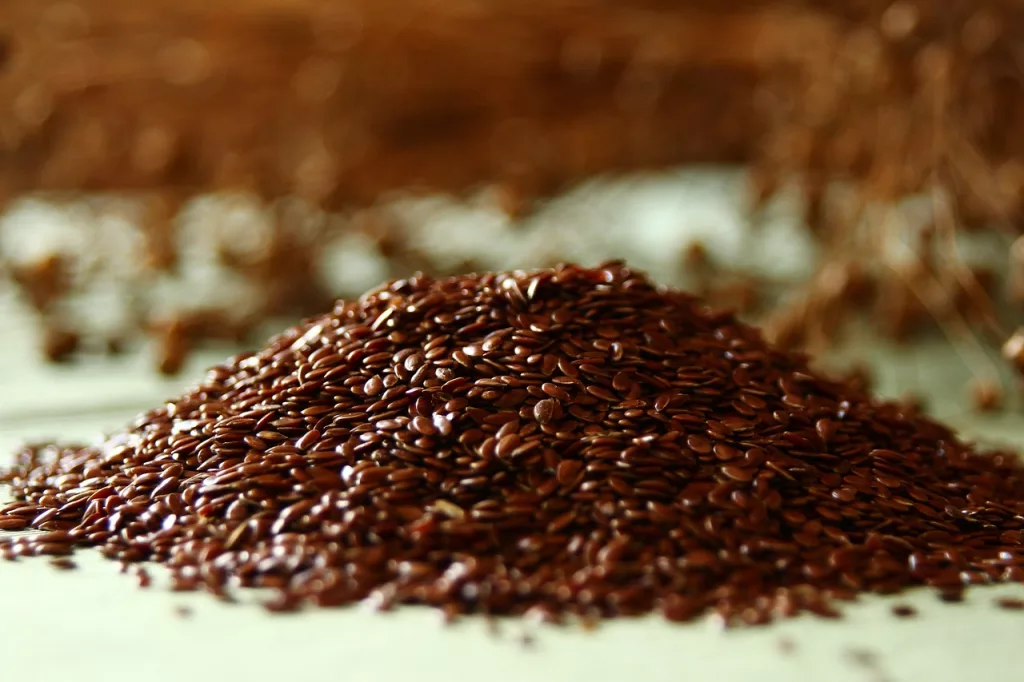In the realm of superfoods, few can rival the impressive reputation of flaxseeds. For centuries, these tiny nutritional powerhouses have been revered for their incredible health benefits. Packed with essential nutrients, flaxseeds have gained popularity worldwide for their potential to promote overall well-being.
In this blog post, we’ll delve into the numerous health benefits of flaxseeds, its nutritional value and explore why incorporating them into your diet can be a wise choice for your health.
Flaxseeds Nutritional Value
Flaxseeds, also known as linseeds, are small, brown or golden-colored seeds that are highly nutritious. Let’s take a closer look at their impressive nutritional profile:

Macronutrients:
- Fiber: Flaxseeds are an excellent source of dietary fiber. A 1-ounce (28 grams) serving of flaxseeds provides about 7.6 grams of fiber, both soluble and insoluble. This high fiber content contributes to digestive health, promotes satiety, and helps regulate blood sugar levels.
- Protein: Flaxseeds are a plant-based source of protein. In a 1-ounce serving, you can find approximately 5.2 grams of protein. Including flaxseeds in your diet can contribute to meeting your protein needs, especially for vegetarians and vegans.
Healthy Fats:
- Omega-3 Fatty Acids: Flaxseeds are one of the best plant-based sources of omega-3 fatty acids, specifically alpha-linolenic acid (ALA). These essential fatty acids play a crucial role in brain health, reducing inflammation, and supporting heart health.
Vitamins:
- Vitamin B1 (Thiamine): Flaxseeds contain thiamine, which is important for energy metabolism and the proper functioning of the nervous system.
- Vitamin B6: This vitamin is involved in various physiological processes, including brain development, metabolism, and immune function.
Minerals:
- Manganese: Flaxseeds are rich in manganese, which supports bone health, wound healing, and antioxidant defense.
- Magnesium: This mineral is essential for numerous biochemical reactions in the body, including energy production, muscle function, and maintaining heart health.
Antioxidants:
- Lignans: Flaxseeds are particularly rich in lignans, which are plant compounds with antioxidant properties. Lignans have been associated with various health benefits, including hormone balance and reduced risk of certain cancers.
It’s worth noting that flaxseeds are also relatively low in carbohydrates, making them suitable for individuals following low-carb or ketogenic diets. Additionally, flaxseeds are gluten-free, which makes them a valuable option for those with gluten sensitivities or celiac disease.
To reap the full nutritional benefits of flaxseeds, it’s recommended to consume them in ground form as whole seeds may pass through the digestive system without being fully digested. Grinding flaxseeds allows for better nutrient absorption.
Health Benefits Of Flaxseeds
From promoting heart health to boosting digestion and supporting brain function, flaxseeds offer an abundance of advantages for our overall well-being.
1. It Is Rich in Essential Nutrients
Flaxseeds are a remarkable source of essential nutrients. They are an excellent plant-based source of omega-3 fatty acids, which are crucial for brain health and reducing inflammation in the body. Flaxseeds are also high in fiber, protein, B vitamins, magnesium, and manganese, making them a nutritionally dense addition to any diet.

2. Good For Heart Health
One of the most well-known benefits of flaxseeds lies in their potential to promote heart health. The omega-3 fatty acids found in flaxseeds have been associated with a reduced risk of heart disease. These healthy fats help lower blood pressure, decrease cholesterol levels, and reduce inflammation in the arteries. Including flaxseeds in your diet may help support a healthy cardiovascular system.
3. Promotes Healthy Digestive System
Flaxseeds are a great natural remedy for digestive issues. The high fiber content of flaxseeds promotes regular bowel movements and helps prevent constipation. The mucilage, a gel-forming fiber found in flaxseeds, acts as a gentle laxative and can soothe an irritated digestive tract. Adding flaxseeds to your diet may contribute to a healthy digestive system and alleviate common gastrointestinal discomforts.
4. Hormonal Balance
For women experiencing menopause or hormonal imbalances, flaxseeds can offer significant relief. These seeds contain lignans, plant compounds that possess estrogen-like properties. Lignans can help balance hormone levels, reducing symptoms such as hot flashes, night sweats, and menstrual irregularities. Flaxseeds have been praised for their potential in supporting women’s health during different stages of life.
5. Great Antioxidant Power
Flaxseeds are an abundant source of antioxidants, which play a crucial role in combating oxidative stress and reducing cellular damage in the body. The antioxidants found in flaxseeds, such as lignans and vitamin E, can help neutralize harmful free radicals, thus protecting cells from premature aging and reducing the risk of chronic diseases, including certain types of cancer.

6. Helps in Weight Management
If you’re looking to shed a few pounds or maintain a healthy weight, flaxseeds can be an invaluable addition to your diet. The combination of fiber, protein, and healthy fats in flaxseeds provides a sense of satiety, helping you feel fuller for longer. Additionally, the omega-3 fatty acids in flaxseeds can enhance metabolism and promote fat burning.
Incorporating Flaxseeds into Your Diet
Now that we understand the many health benefits of flaxseeds, let’s explore some simple ways to incorporate them into your daily diet:
- Ground Flaxseeds: Grinding flaxseeds enhances their digestibility and allows for better nutrient absorption. Add a spoonful of ground flaxseeds to your morning smoothies, cereals, or yogurts.
- Flaxseed Oil: Drizzle flaxseed oil over salads or use it as a dressing base to reap its nutritional benefits. However, remember that flaxseed oil lacks fiber, so it’s best to consume the whole seeds for maximum health benefits.
- Baking Ingredient: Use ground flaxseeds as a substitute for eggs in baking recipes. Mix one tablespoon of ground flaxseeds with three tablespoons of water to replace one egg.
Conclusion
Flaxseeds are a true nutritional powerhouse, offering a multitude of health benefits. From supporting heart health and digestive wellness to aiding in hormonal balance and weight management, these tiny seeds deserve a place in your daily diet. Remember to purchase whole flaxseeds and grind them just before consumption to preserve their valuable nutrients.
So why not sprinkle some flaxseeds into your meals and unlock the incredible health benefits they have to offer? Your body will thank you for it!








